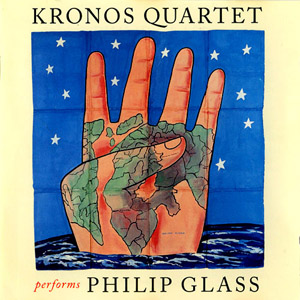 Mark Swed, in his essay accompanying Kronos Quartet Performs Philip Glass begins with the claim that “Philip Glass’ string quartets may contain some of his most intimate music.” If I wanted to quibble, I could point out that Richard Guérin made the same claim about the Songs on Songs and Poems for Solo Cello. But that misses the point: as much as Glass is identified with his large-scale theatrical works, he has also created a body of small-scale works for string quartet or solo instruments. Listening to these four of his quartets, one says to oneself, first, “Is this Philip Glass?” And then it becomes obvious that it is.
Mark Swed, in his essay accompanying Kronos Quartet Performs Philip Glass begins with the claim that “Philip Glass’ string quartets may contain some of his most intimate music.” If I wanted to quibble, I could point out that Richard Guérin made the same claim about the Songs on Songs and Poems for Solo Cello. But that misses the point: as much as Glass is identified with his large-scale theatrical works, he has also created a body of small-scale works for string quartet or solo instruments. Listening to these four of his quartets, one says to oneself, first, “Is this Philip Glass?” And then it becomes obvious that it is.
The thing about chamber works is that the composer often feels free to explore ideas that won’t necessarily work in larger, orchestral works, or might (in the case of Dmitri Shostakovich, for one) result in exile to Siberia. Glass himself said “It’s the way composers in the past have thought and that’s no less true for me.” It’s apparent from the beginning of the first track on this album, the first movement of String Quartet No. 5 from 1991. It is very much a late twentieth-century work, with all the “busyness” and bustle that is meant to reflect modern life. It’s also more melodic than most such works and more so than one expects from Glass — it is not particularly what I would call “typical.”
String Quartet No. 4 (Buczak) (1990) begins with a sequence of somber chords that is not typical of Glass, but that serves to set the mood for the work: it’s an elegy, a remembrance. The mood holds through the more typical figures that continue the first movement. The second, again, begins with a melancholy passage that reminds me of someone like Morton Feldman as much as Philip Glass — it has the same sense of infiltrating space as does Feldman’s Rothko Chapel. The third movement recalls other works by Glass. I can’t remember where I’ve heard those melodies, but I have, in different form, perhaps, but the sense is the same.
In Quartet No. 2 (Company), from 1983, one sees Glass’ signature style — rapid, repetitive patterns underlying a reductive “melody” — developing, if not completely mature. Interestingly enough, this one was originally composed as a theater piece, although Glass intended it to be able to stand alone. And it’s been driving me crazy: I will swear I have never heard Company, but I remember this music — but I am not about to go digging through my music library to figure out where. The point is, it was captivating then, and it is now.
“Mishima” (String Quartet No. 3 [1985]) was adapted from Glass’ score to Paul Schrader’s film of the same title. It is itself a dramatic piece, building a fair degree of tension from the very beginning — even the quiet passages seem drawn tight, like a wire about to snap, and the larger, more overtly dramatic sections are almost a relief.
I don’t know if this is Glass’ most intimate music — a lot of it is reworked from much larger theatrical pieces — but there are some interesting ideas at play here, a strong sense of a composer exploring beyond the boundaries he has set himself. There are many places where Glass seems to have loosened up — the music flows more freely and intuitively that it usually does in his larger works. And I can’t think offhand of a more suitable ensemble to perform these works than Kronos. As an ensemble, they have perhaps the widest ranging repertoire of any chamber group in existence, but their strength has always been their sympathy and understanding of contemporary music. Kronos began working with Glass, in fact, during the recording of the soundtrack for Mishima, and has since worked with him on all five of his numbered quartets. In fact, they gave the first concert performance of his String Quartet No. 1 in 1986.
This is another disc that has earned a place in my “listen frequently” list.
(Nonesuch, 1995)
